Because someone asked, here is how to make a lined, zippered bag.
To start: Sorry for my ironing board. It's very water stained and ugly. The pattern pieces would be the same for any bag, from a large tote to a handbag to a cosmetic bag. All that changes are the dimensions. You can make it more rectangular or more square. You can make it two-toned by cutting the pattern and adding seam allowances and using two different fabrics.
What you need: outer fabric, liner fabric, craft-weight fusible interfacing, thread
I am making this little bag to carry my knitting in. It looks like a purse, but it's small and has tiny, useless handles. It's basically to keep my knitting in when I throw it into my big work tote. Therefore, it's not perfect, and I don't really care too much. I probably wouldn't have bothered with straps except that I wanted to show how you put them on for the sake of the tutorial.
If you want to do bamboo handles, see bottom for explanation.

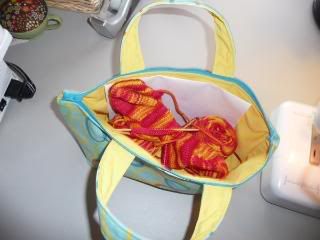
To start, you'll need to cut a pattern like this. I have put measurements on here. If it's too small, you should be able to click it and see a bigger version. If that doesn't work, right-click and save it to your computer and then view it. Like I said, just change the dimensions to the sizes you want to make any bag.
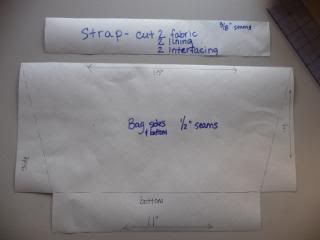
Here are all my pieces cut out: 2 linings (they have damp spots in the pic), 2 outer pieces, 2 interfacing pieces. Same for the straps.
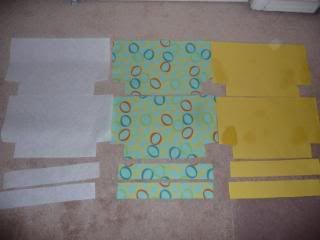
Next, fuse the interfacing to the wrong sides of the outer pieces and outer straps.
To make the straps, pin right sides of outer and liner straps together (NOTE: if you want to do bamboo handles, see bottom of tutorial for more information for this step):
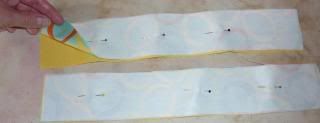
Then sew. I use a 3/8" seam allowance on the straps. Next, turn right side out and press. Then top stitch:
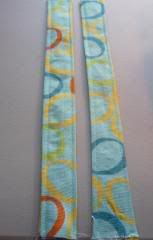
Next, attach the straps to the outer pieces, raw ends and right sides together. Baste. I wouldn't sew on too hard at this point because it's inevitable that the straps will not match up in a future step and you'll have to adjust. But do your best to make them exactly the same on each piece.
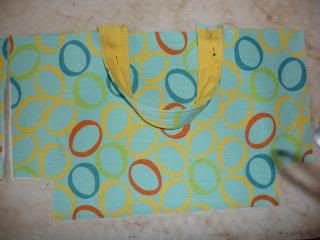
Now for the zipper: You want it to be about 2 inches shorter than the top of your bag. I had to trim mine. You'll attach scraps of your main fabric as shown in the photo, sew, then press to the right side. This will help with sewing it up later and make nicer corners.

Trim the width of the scraps to the width of the zipper, as show on right side. Don't worry about the length yet.

Center the zipper above the main piece top and trim the scraps so the zipper is the same length as the bag. As you see, the scraps on the ends of the zipper have ensured that no zipper is dealt with in the seam allowance when you sew. You'll be sewing over the scraps instead of the zipper.
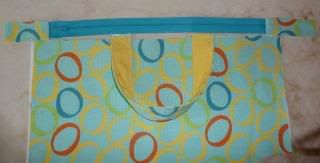
Now sandwich the pieces with the zipper between the outer piece and the lining, with the right side of the zipper facing the right side of the main piece, and the right sides of the lining and main fabric facing, as well. The strap must not be sticking out the top. It will be hidden right now.
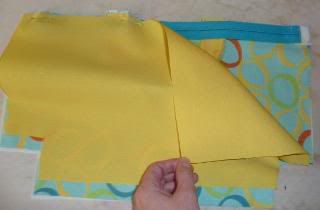
Here, I have sewn through all thicknesses. You may need to start below the zipper pull and sew down, then move the zipper pull and sew the top of the seam. View from outside and view from inside:
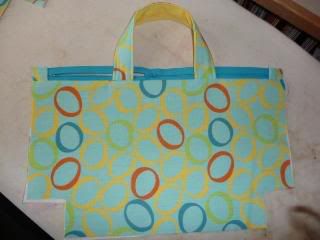
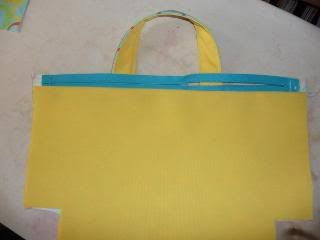
Repeat with other side of zipper. It will look like this when it's pinned. THIS IS IMPORTANT: At this point, with it pinned, open it up to the right side and make sure the straps are straight across from each other. They likely won't be, no matter how careful you were earlier with measuring. You may have to remove some of the basting and line them up better. Sew your second "sandwich." Sorry, but once again, the straps may look misaligned and you'll have to remove a bit of stitching and fix them again. This is the most aggravating part to me, but when it's a zippered bag, misaligned straps are obvious when it's closed in a way that it's not when you have an open-top bag.:
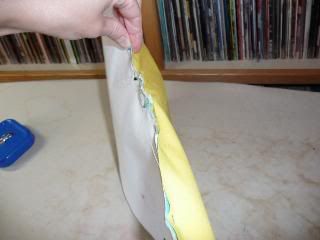
After both "sandwiches" are sewn. I have pressed and top stitched the bag along the zipper:
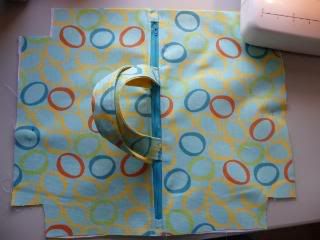
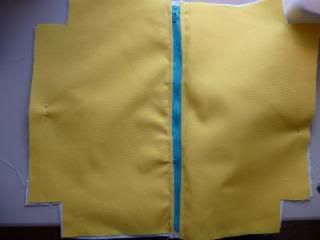
Next, OPEN THE ZIPPER MOST OF THE WAY. THIS IS VERY, VERY IMPORTANT. If you don't, you can't turn it right side out later. Leave it about one inch from all the way open, so the zipper pull doesn't interfere with sewing the sides.
Put outer piece with outer piece and lining with lining and pin right sides of each together:
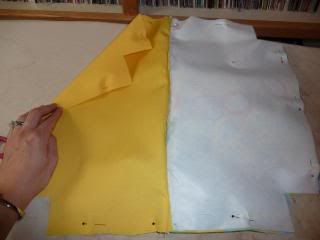
Sew in one continuous seam down each side and sew the bottom of the outer fabric. When you sew the bottom of the lining, leave a large hole to turn the whole thing through later. The cut-out corners remain open.
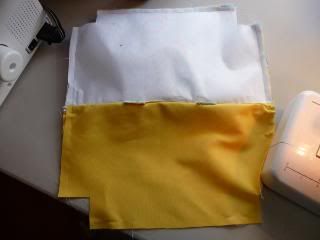
Here's where you sew the corners. This is going to give your bag a flat bottom. It helps to press the seam allowances open. Right now, your bag is flat. Push the cutouts open the other way:
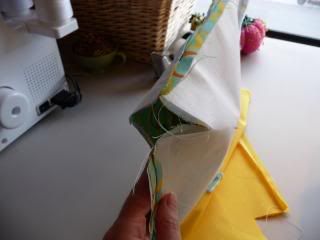
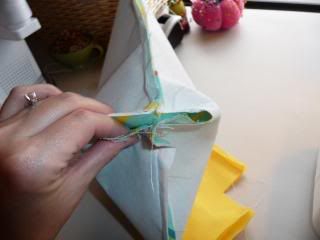
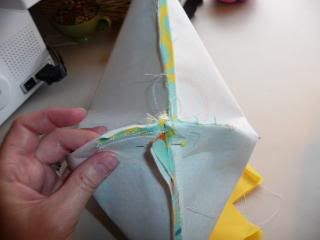
Sew across:
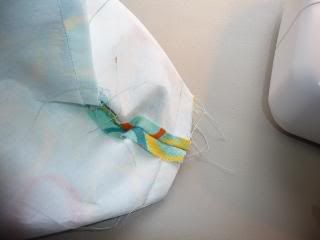
Same for the lining cutouts:
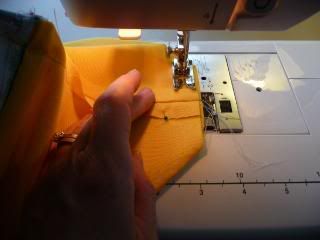
Now your bag is no longer flat. It looks like this, and the only unsewn place around the whole thing is part of the bottom of the lining:
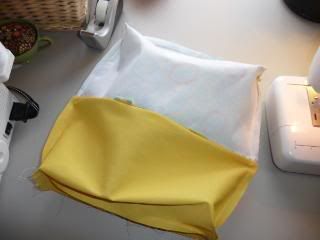
Turn right side out through hole in lining. Reach through and push out corners, especially on edges of zipper. Then turn in raw edges of lining and pin. I just sew mine across with the machine. It's not invisible this way, but it's fast. You can also do a more invisible seam by hand.
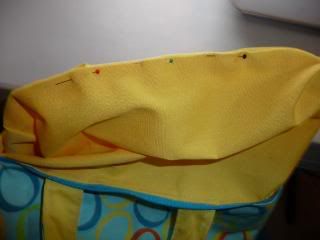
Now tuck in your lining and press your bag! Go to the top of this post for the finished product.
FOR BAMBOO HANDLES: Get the kind with brass hardware, not the kind that are bamboo all the way around and form a circle or half-circle. You'll just be attaching loops for the handles during construction. After the entire bag is done, you'll remove the brass hardware from the handles and insert through the loops, then you'll reattach the hardware to the handles.
What I do is take a piece of fabric about 6.25" by 2.25". I fold it in half lengthwise, right sides together. I sew with a small seam allowance and turn right side out. Then I fold it in half lengthwise and cut. I then fold each of those in half the same way and cut again, so I have four tabs. Each tab is folded with raw edges together and sewn on in place of the straps in the tutorial above. Where you put them depends on how wide your handles are. Again, like the straps, be very careful about making them line up.

3 comments:
I am planning on trying this tutorial out tomorrow, but I cannot read your measurements. Even when I save the photo to my own computer it is just too pixelated. Help!
Sorry about that. I was kind of doing just a sample bag with the intentions that you could use the basic shape with any measurements. Funny thing is, I just cleaned out my sewing room this week and threw that piece of paper away.
From what I can tell, for that exact bag it was 11" across the bottom, 15" across the top. And the sides were probably about 9". The cutout squares at the bottom were probably about 1.5".
If you go to my blog on the top right and email me, I can give you measurements of some similar bags that I still have patterns for -- some handbag size, some tote bag size.
Thank you Robyn, your tutorial was great,it worked beautifully! Cheers!
Post a Comment